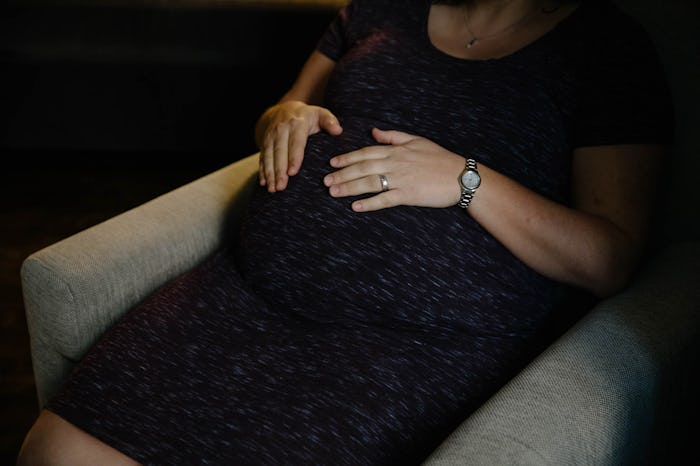Pregnancy comes with its fair share of challenging symptoms. Nausea, vomiting, itchiness, skin and hair changes, and the swelling of pretty much every body part. Some other possible symptoms are less discussed, but still very real. Pregnancy can change your teeth, your immune system, your allergies, and even cause your bones to grow. Even your hands may be affected. Exactly, what'll happen to your hands during pregnancy? Well, it could be a number of things.
According to Dr. Daniel Shapiro of Prelude Fertility, hands, like everything else in a pregnant woman’s body, can retain fluid and swell. Swelling in hands and feet (called edema), is normal, especially in the later part of pregnancy, he says in an interview with Romper.
Dr. Mary Jane Minkin, M.D., Clinical Professor of Obstetrics and Gynecology at Yale University confirms that the hands can definitely experience changes in pregnancy. Many women experience fluid retention, and the hands are usually involved. Rings get very tight, she says in an interview with Romper, and Minkin always encourages patients to take off rings when they feel snug, because, often, women have to have rings cut off if they aren't removed in time.
Minkin also notes that this swelling may cause many women to experience carpal tunnel syndrome towards the end of their pregnancy. That is typically caused by the swelling of a band, the flexor retinaculum, that goes across the wrist. It could begin to press downward on the median nerve to the hand, so many women experience numbness or pain in the middle part of their hands — middle fingers in particular.
As Parents noted, it may become painful to type, or close your hand around common things, like your water bottle or phone. Carpal tunnel syndrome can become aggravated at night, when all the fluid of the day has pooled in your extremities.
While it's normal, you should also keep an eye on your swelling. According to doula Sarah Winward of Your Downtown Doula in Toronto, if swelling is severe, comes on suddenly, or is accompanied by changes in blood pressure, it might be a sign of something more serious. She tells Romper that moms should talk to their health care provider if they are experiencing swelling during pregnancy.
Sleeping with your extremities elevated can help relieve some of the pain associated with swelling in pregnancy, and your doctor can offer more insight on your particular body and the best ways to ease the pains you're experiencing. Who knew your belly wouldn't be the only thing swelling?
